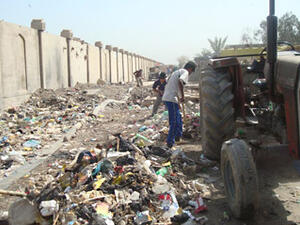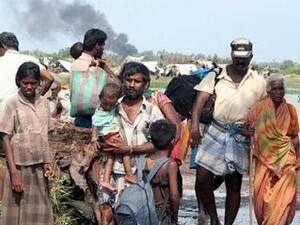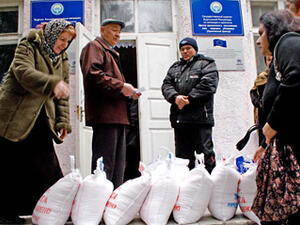UNHCR reinforces cold-weather supplies in earthquake survivor camps
UNHCR reinforces cold-weather supplies in earthquake survivor camps

Earthquake survivors try to stay warm as the sun sets in Maidan camp, near Battagram, in northern Pakistan.
BATTAGRAM, Pakistan, December 9 (UNHCR) - "Do you have three blankets each for all of your family members? What about mattresses?" Abdul Hameed moved from tent to tent questioning the earthquake survivors in Dharra camp in northern Pakistan.
Hameed is a member of one of 24 UNHCR-trained mobile teams currently operating in Pakistan's earthquake zone. He and the rest of the teams - soon to increase to 60 - are surveying the camps as part of the intensified UN effort to make sure they are sufficiently well supplied to withstand the harsh Himalayan winter.
Dharra camp, which has a population of around 700, is one of 40 organized camps that UNHCR is helping the Pakistan authorities to run in earthquake-hit areas. Around 187,000 people are currently living in a total of more than 500 camps - the great majority of which are so-called "spontaneous camps" - as a result of the October 8 earthquake which killed more than 73,000 people.
The first snow began falling on the mountain peaks in late November, and more snow and rain is forecast in the course of the next few days.
"The nights are freezing here," said Saleema Nissa, who moved with her husband and four children to the camp after the earthquake damaged their house on a mountain-side near the camp. "We get some relief when the sun comes out for a while during the day, but when it moves behind the mountains the temperature starts to plunge.
Last winter was harsh, she said, "but then our houses were intact, and we could easily warm ourselves by burning wood in the fireplace. Now we live in a camp. Although, the UNHCR plastic sheets that protect the outside of our tent from the rain and snow are a great help, we were told that having a fire inside could be hazardous. It risks setting fire to the tent. I am worried about my four children in this cold."
Within the joint UN relief effort set up after the earthquake, UNHCR was asked to be lead agency for camp management. As such, it helps the Pakistan government run the camps by providing material and technical assistance, as well as coordinating the delivery of basic services like water, sanitation, education and health care.
Mohammad Adar, UNHCR's senior emergency coordinator, shared Saleema Nissa's worries: "We understand the concerns of the affected population and that's the reason UNHCR is fully focused on winterizing the camps in the earthquake-hit area."
According to Adar, UNHCR aims to provide every tent with a minimum of two plastic sheets, four mattresses, a stove and fuel - and is making sure that each individual has three blankets.
"We have already done this in many camps and are also constantly checking places that have not received the items," Adar said. "To minimize the fire risk, UNHCR is relying on Afghan refugees to train the affected population on how to use a stove inside a tent."
The Afghan refugees, who have experienced life in refugee camps in Pakistan for more than two decades, are also helping to teach the earthquake survivors how to fortify their tents against the freezing weather.
UNHCR plans to bring in another 30,000 stoves on chartered planes, as well as some by road from Iran. The agency is also procuring 250,000 blankets from China and India to add to the 600,000 that have already been sent to Pakistan. So far, UNHCR has distributed some 341,000 blankets, 20,000 tents, 72,000 plastic sheets and 27,000 jerry cans to survivors of the earthquake.
After concluding his quick survey of the winterized items in the camp, Abdul Hameed fills a request sheet for the supplementary items required immediately by the camp population.
"The camp residents have got two blankets each," said Hameed in response to a request from a Pakistan army official in the camp, "and we are immediately bringing in one more for each person in the camp, to meet the three-blankets-per-person criteria."
Meanwhile, the men in the camp were giving the final touches to the camp's first mosque, which has been constructed out of UNHCR plastic sheets.
"We will remember all of you in our prayers who have helped us in this tough time of our life," said Mohammad Naseeb to the UNHCR field officer who was about to join him in prayer inside the mosque.
In Pakistan, the UN refugee agency is involved in the voluntary repatriation of Afghans. The programme is one of the largest voluntary repatriations that the organization has ever carried out in its 55-year history. A census conducted by the government of Pakistan and UNHCR in early 2005 counted more than 3 million Afghans living in Pakistan, since when some 442,000 Afghans have returned home. In all, around 2.7 million Afghans have returned home from Pakistan since the beginning of the voluntary repatriation in early 2002. A further 1.5 million have gone home from Iran.
With a mandate to help refugees fleeing war and persecution, UNHCR does not normally get involved in natural disasters. However, the sheer scale of last December's tsunami and the October earthquake, coupled with the agency's existing operational capacity in Sri Lanka and Pakistan, resulted in it offering its services in both of these relief efforts.
"For us as a refugee agency, the problems faced by the people of Pakistan are our problems," António Guterres, the UN High Commissioner for Refugees, told reporters during his visit to Pakistan last month. "And we could not do anything else but to be fully committed, together with the UN system, in supporting the government and people of Pakistan in this moment of suffering.... We have limited resources and capacities but one thing I can guarantee you - all our resources and capacities are at your disposal."
By Babar Baloch in Battagram, northern Pakistan









